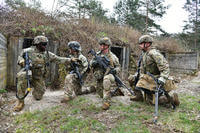Citing the most difficult fiscal environment he’s seen in over 30 years spent on Capitol Hill, powerful Pennsylvania congressman Jack Murtha, chairman of the House Appropriations defense subcommittee, said make no mistake about it, “there is going to be less defense spending.” As for the emergency wartime supplementals, Murtha said: they “gotta go.”
Murtha said the military’s personnel costs, running at $153 billion this year, are getting out of control. The Pentagon cannot increase both the end strength of the ground forces and procurement spending at the same time. “We’ve got to slow down the personnel increases, because that’s where the real money is, and at the same time reform the acquisition process so we can buy at a reasonable rate.”
Despite record levels of defense spending, which reached $656 billion in 2008, overall military readiness has fallen to dangerous levels because of the grinding demands of the Iraq war, Murtha said, speaking today at the Center for American Progress, a Democratically aligned think tank in Washington, D.C.
The most pressing national security challenge facing the incoming Obama administration will be “redeploying from Iraq and then developing an achievable strategy for Afghanistan.” Murtha was clear to make the point that he was not saying troops should be pulled from Iraq and sent to Afghanistan. First, he wants to hear the Obama team’s plan for how it intends to avoid becoming another in a long list of countries that have invaded Afghanistan only to meet an ugly fate fighting its implacable tribes. “I’m concerned when I hear of increasing our military presence by up to four brigades without a plan,” not only for Afghanistan, but for the entire region. The U.S. faces a much tougher and more formidable foe in Afghanistan than it did in Iraq, he said.
The challenge will be to “manage current and future threats under a constrained defense budget.” The economy is in recession and federal deficits and debt are at historic levels. There is a growing list of claimants for federal money to bail out failed business, for infrastructure projects to spur economic growth and for entitlement spending to care for an ageing population, he said.
While he did not identify specific weapons programs that should be either cancelled or curtailed, he chided the military services for failing to provide Congress with consistent numbers of how many ships, fighters and other pieces of equipment they really need and their habit of constantly changing program requirements.
Air Force acquisition is a mess and must be fixed, Murtha said, citing the never ending aerial tanker story and the two decades it took to develop the F-22. The Navy also came under fire for changing its mind on whether it needed the complex and costly new-build DDG-1000 destroyer or wanted to buy more DDG-51 destroyers.
The military’s long list of challenges cannot be addressed until the nation has a comprehensive national security strategy. “It should be based on what effects our national security, period.” He called the Iraq war a “terrible, terrible mistake,” part of the Bush administration’s short sighted, reactive strategy based on the events of September 11, 2001.
Murtha said he opposed creation of the all-volunteer force because he feared the U.S. would be unable to field enough troops in the event of a protracted war without a draft. Those fears have been borne out, he said, as the Army has been forced to stop loss 185,000 soldiers, “that’s a draft, they’re keeping people beyond their enlistment.” The Army has had to accept lower quality recruits and while Army and Marine Corps re-enlistment and recruiting numbers are up, it has cost the U.S. $2 billion in bonuses since 2007. Defense Secretary Robert Gates has failed to make good on a vow he made in 2007 to end stop loss, Murtha said.
Murtha blasted the intelligence community for a long history of failures, despite the fact that the U.S. spends more on intelligence than any country in the world. The intelligence agencies have become top heavy with too many administrators and their organization should be re-examined.
Also speaking at today’s event was another Democratic congressman from Pennsylvania, retired Navy admiral Joe Sestak, who urged OSD to get involved in the requirements side of the service’s acquisition process. “The military should set the requirements, but there should be in the process that linkage between strategy and requirements.” The JROC has become like the old JCS where all the services get an equal share of the budget, he said.
He said the Goldwater-Nichols act, that created incentive for a joint force, should be extended to create a truly joint acquisition process to eliminate redundancies across different services’ programs.
[Photo: Reallynews.com]








